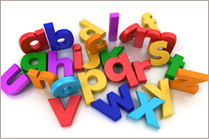Working with an Agency
Selecting an Agency
Because intercountry adoptions are complex, most adoptive families work with an agency or adoption service provider. Choosing a qualified adoption service provider is a very important part of the adoption process. It is important to do your homework before selecting an agency. You may wish to talk to other families who have adopted internationally. What agency did they choose? Was the agency always helpful and upfront? In addition, contact your state's licensing organization to find out what providers are licensed in your area (adoption service providers generally must be licensed by the state in which they operate). Ask if there are any unresolved complaints against an agency. You can also contact your local Better Business Bureau regarding a particular adoption service provider.
If you intend to adopt from a country party to the Hague Adoption Convention, you will need to select an adoption service provider that has been accredited or approved ( accredited agencies / agencies denied accreditation ) by one of the two Accrediting Entities - the Council on Accreditation and the State of Colorado Department of Human Services - designated by the Department of State. In addition, other countries have their own accreditation process for adoption service providers.
Meet with several agencies. Sit down with each of them and find out what services they offer. They should be willing to disclose specific information about their operations and procedures in writing. We recommend that you review as much information as possible before you sign a contract with any agency. For example, an adoption service provider should disclose to you in writing such things as:
- A sample written adoption services contract;
- A proposal of all expected total fees and estimated expenses;
- Its adoption service policies and procedures, including general eligibility criteria;
- A list of any people and organizations not directly employed by the agency that would help with your adoption, and the costs of their services; and
- The number of adoption placements per year, and the number of these placements that remain intact.
In addition, before you commit to one agency, consider requesting the following:
- A list of families who have adopted through the agency who have agreed to act as rereference for the agency. These families can be a wonderful resource.
- Proof that the agency's state license is current and valid. You can research license validity through The National Adoption Information Clearinghouse.
- A copy of the agency's refund policy. In case there are changes in your circumstances, or changes in country policies, this is vital information to have.
- Copies of all contracts that will be signed between your family and the agency.
- A list of all the agency's fees and a fee schedule, including:
-
- The home study fee
- Adoption expenses in the United States
- Foreign country program expenses
- Childcare expenses incurred prior to adoption
- Translation and document expenses
- Contributions to child welfare service programs in the child's country of origin
- Fees for post-placement and post-adoption reports
- Third-party fees
- Estimated travel and accommodation expenses
Once you choose an adoption service provider, you will be expected to sign an adoption services contract with that agency. Only accredited or approved adoption service providers (organizations or individuals) will be eligible to provide adoption services in adoptions with Convention countries.
Adoption Services
If you adopt from a Convention country, your adoption service provider will generally be responsible for providing you with six adoption services:
- Identifying a child for adoption and arranging an adoption;
- Securing the necessary consent to termination of parental rights and to adoption;
- Performing a home study and reporting on prospective adoptive parents or a background study and report on a child;
- Making non-judicial determinations of a child's best interests and of the appropriateness of an adoptive placement;
- Monitoring a case after a child has been placed with prospective adoptive parents until final adoption; and
- Assuming custody of a child and providing childcare or any other social service, when necessary, because of a disruption pending alternative placement.
If you adopt from a non-Convention country, the services provided by your agency vary from case to case. You may work closely with an agency each step of the way, or you may do much of the work yourselves. Regardless, you and your agency should agree and specify in writing what services it will provide, and how much you will be charged for those services.
Independent Adoptions
Some families seek to save adoption services costs by completing an "independent adoption". However, we strongly recommend that you work with a reputable adoption service provider in a non-Convention adoption case and that you retain an accredited adoption service provider in a Convention adoption case. There are many critical social work tasks and other functions that must be completed in a professional manner for an intercountry adoption to go smoothly. In addition, some U.S. states and some countries prohibit independent adoptions.
In Convention adoption cases, avoid unaccredited adoption service providers who claim that they can 'assist' or 'help' your family as you complete an "independent adoption". Under the Intercountry Adoption Act, it is a criminal offense for an adoption service provider to provide any of the six adoption services in a Convention adoption case without being accredited, approved, supervised, or considered exempt. This prohibition applies even if the un-accredited adoption service provider alleges that it just sought to assist a family completing an "independent adoption" by providing only some adoption services. The Department encourages prospective adoptive parent(s) to report to the Department any adoption service providers who are offering adoption services between the United States and another Convention country without being accredited.
Agents & Facilitators
Licensing of agents and facilitators overseas is done according to the law of the foreign country. Not all foreign governments require that agents and facilitators be licensed or have the resources to investigate complaints or prosecute illegal activities. As a result, it can be difficult to hold facilitators accountable for fraud, malfeasance, or other bad practices in general.
If you are adopting from a Convention country, local agents and facilitators must operate under the supervision of an accredited or approved adoption service provider (generally know as the "primary provider"). Adopting parents should question their accredited adoption service provider about the qualifications and experience of any facilitators that it might use in a Convention country and the degree to which the agency assumes responsibility for the actions of its agents or facilitators.
Complaints
If you are adopting from a Convention country and you encounter a problem with your accredited adoption service provider, the Department of State has established a process for filing a complaint against that agency. First submit the complaint in writing directly to your accredited adoption service provider. If it is not resolved through the organization's complaint process, you may file the complaint with our internet based Hague Complaint Registry.
Complaints submitted to the Hague Complaint Registry will be available to the relevant accrediting entity and to the Office of Children's Issues.
If you are adopting from a non-Convention country, you may also submit a complaint to our office at the email address AskCI@state.gov. In addition, we recommend contacting the state licensing agency of the state in which your adoption service provider is licensed. Contact information for state licensing agencies is available from Child Welfare Information Gateway.
Help Prevent Adoption Fraud
Take care to avoid possible adoption scams. Use only reputable agencies, attorneys, and facilitators. If the answers to your questions appear to be contradictory, vague, or unrealistic, be wary. The consular section in the U.S. Embassy or Consulate in the country of planned adoption can provide accurate information concerning local legal practices. If you have problems with agencies or intermediaries in the United States, you should report these concerns immediately to our office and to the appropriate state authorities.
Some states have moved to revoke licenses or prosecute the individuals connected with fraudulent activities including these two common abuses: 1) knowingly offering a supposedly healthy child for adoption who is later found to be seriously ill, and 2) obtaining prepayment for adoption of a nonexistent or ineligible child. In some countries, it is advisable to have the child examined by a physician of your choice before accepting the referral. This examination along with its report, supporting documents, tests and videos, can be reviewed by a U.S.-based physician trained to evaluate such information. Such an exam is separate from the routine medical examination required after completion of the adoption for visa purposes.




